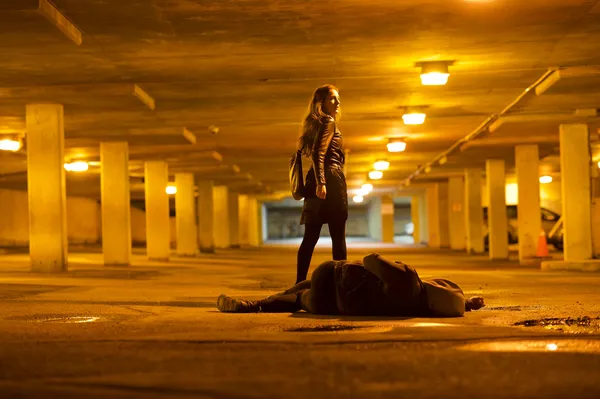 |
| Lesley Smith and James MacLean in Compulsus Photo: Jessie Redmond |
Director Tara Thorne’s feature debut, Compulsus, screening in Fantasia’s ‘Queer Genre Cinema Spotlight’ section, centres on two women who pursue vigilante justice against perpetrators of misogynistic crimes.
Spoken-word poet Wally (Lesley Smith) listens intently to the woes of her straight friends, who find it hard to meet worthwhile men. Meanwhile, word gets around town about a series of sexual assaults. When Wally goes on a first date with Lou (Kathleen Dorian), the chef at the restaurant happens to be this notorious perpetrator. Unable to restrain herself, Wally attack the chef, and the pair, encouraged by responses on social media begin a vigilante wave of either justice or terror.
 |
| Tara Thorne Photo: Heather Young |
In conversation with Eye For Film from Fantasia, Thorne and Smith discussed challenging the representation of the transparent woman, while giving space for a woman’s anger and rage to exist.
Paul Risker: Film can be an exploration of what makes us human, and the world around us, as much as an entertaining experience. Some filmmakers describe cinema as a “Trojan Horse”, adept at subtly presenting bigger ideas. Is this a sentiment you’d agree with?
Tara Thorne: Look at a movie like Everything Everywhere All At Once, which was a huge phenomenon. I loved it in the moment, but I've no interest in seeing it again. I don't think about it, even though it has those moments of big ideas, and people are tapped into it.
Now I've made a movie, it ruins watching them because you think, ‘Wait a second, how much money did they have for that, and how did they break down these days?’ I can’t imagine the documents that would have been created to produce that movie. It's astounding the way it moves around – it’s dazzling.
It has a message of connection, about how your life doesn’t have to be big and dazzling – it can be here's the person that you love, who you spend an ordinary life with. I think you get that with cinema more than with music or the visual arts. Everything is interpretative, and yes, you can go into a lot of films, and depending on your perspective and the baggage you take in with you, what you've lived to this point, nobody should have the same reaction twice.
PR: Is anger a motivational force behind Compulsus?
 |
| Lesley Smith and Kathleen Dorian as Wally and Lou, on a date Photo: Jessie Redmond |
TT: … I couldn't have written this movie when I was 25. I needed decades of personal progression, dealing with people, and living under the patriarchy as it were, to get angry. There were these series of events in pop culture that were capped off in Canada with the Jian Ghomeshi trial, where he was accused of attacking multiple women. I knew two or three of them in an acquaintance sort of way, and it touched all of the people in my life.
It was during that time I found out how many people I know are survivors of sexual assault. I thought they were like me: Aren't we lucky. But it was: No we’re not. So many people are walking around carrying this trauma, carrying the worst thing that ever happened to them as if it never happened. I thought that doesn't seem fair, so I took that and I ran with it.
Lesley Smith: … What if women get angry the way men get angry? That’s something in the film I loved playing with, and I loved seeing it on the screen because it's rare to see a woman's anger and rage given space to exist.
People are then nervous about whether you endorse vigilantism and this violence. No, I don't, but it's a film, it's fantasy. It allows a peek into what if a woman got angry the way a man did.
TT: And there's no one to tell her to be quiet and simmer down.
 |
| Lesley Smith as Wally training for revolution Photo: Jessie Redmond |
PR: Why don’t we see women’s anger expressed? Are we still trying to nurture this idea of woman has innocent and motherly, which stems from patriarchal control of our culture?
LS: I was recently reading about a study, about the way we view people when they're angry. If male politicians show anger, their ratings go up, but the opposite happens for a female politician. Women are policed around their anger and how they display it. It's fascinating that we allow it in the public arena for men, but not for women.
TT: It makes people super uncomfortable. In the rough cut stages, the most delicate part of the process, where you're showing people this half finished thing and asking them to tell you what's wrong with it, I had a couple of women say, "You’re asking me to get behind her without any evidence.” I thought, ‘Yeah, the evidence is lifelong rage. I don't know what more you need.’
We immediately believe men when they say, “I didn't do it.” I don't know what goes into the thought process of attacking a random stranger, but we don't say, "Why did they do it?” Of course they did it, but women are struggling with that.
We've spoken to a couple of people who’ve said that most superheroes are vigilantes, but we don't talk about that. We don't talk about how Batman and Wally have a lot in common, other than their income bracket.
LS: What could Wally achieve if she were a multi-millionaire?
 |
| Lou and Wally are approached by a man Photo: Jessie Redmond |
PR: The image of the maternal woman is filled with irony when we consider the adage about a mother’s wrath.
TT: The mother thing is what I feel makes this film subversive. She’s not a mother, but if Wally had a kid who'd been murdered, people would think she should kill everyone in her path, John Wick style. She doesn't have that, she's not even personally invested, and she's not even a straight woman who dates men. She's like, ‘Fuck these guys, I'm taking them out because someone has to.’
This idea of a mother’s wrath, or a rape survivor, those are the two inciting incidents that we see in action films where women are protagonists taking revenge. Something horrible has to happen to them, and I don't agree. I think it's a smear across your whole life, a minimum thin coating, and then one day, that's it.
PR: The moral quandary at the heart of the film is are the male victims guilty, and does Wally risk becoming the thing she’s fighting?
LS: It's interesting what you say about whether she’s becoming the thing she's fighting against. I always felt there's a certain point in the film, in Wally's journey, where she's perhaps okay if that's the case. What she’s fighting feels so much bigger than herself, or her life – what is she willing to sacrifice for that cause?
TT: We don't know if they're guilty and I'm fine with it [laughs]. They probably did something, or it’s for a future thing they’re going to do.
 |
| Wally reads a poem on stage Photo: Jessie Redmond |
A movie I know we both love that we saw leading into the shooting was, Promising Young Woman. And that's a movie that people have differing opinions on. I loved it, but it has a different ending than ours.
My whole feeling about that character is she's traumatised from the beginning, and she's so blinded by her own trauma that she can't get out of it. What happens to her in the end is telegraphed by the entire movie and she doesn't care. She's dead already when we meet her.
The difference when we meet Wally is she's at the beginning of her vigilante journey. She’s trying to figure out what she's doing because she doesn't know. She’s following an impulse and when it becomes clear, she’s going to go and sort it out.
PR: The way you choose to shoot the film, without showing the men's faces, ties into the impulsive and blinding nature of trauma.
TT: Initially every character had a name, and we were going to bleep them all out. I would change the name based on who was reading the script, but by the time we got into production, the producer said we should take out all the names in case we get sued, because someone thinks it's them.
The bleeps are faked, but the intention was to never hear a name, to never see a face, which is the reason the same actor, James MacLean, plays all of them because they're an object.
We're flipping the script on action movies, or really anything, television shows that have nameless, often faceless women who are the victims. You see their body, you see their trauma, but they aren't three dimensional characters who you see or care about. All you know is this woman has been wronged, and the hero is going to sort it out.





















